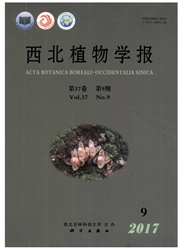

 中文摘要:
中文摘要:
叶片性状反映了植物对环境的高度适应能力及其在复杂生境下的自我调控能力。叶片性状如何响应和适应气候变化是植物适应性研究的重点内容。该文系统综述了叶片大小、比叶质量、叶片氮含量、碳同位素等指标对气候变化响应的最新研究结果。不同叶片性状对气候变化的响应结果存在差异,所指示的生态学含义也有所不同。单一叶片性状不能全面地反映植物对气候变化的响应;不同尺度的研究(如环境的修饰或筛选作用的研究)还存在很多不确定性。高寒地区的研究工作相对缺乏。该文有助于理解植物与气候之间的相互关系、植物对气候变化的响应与适应对策,对了解植物演化、预测植物在未来气候变化条件下的变化特征具有一定意义。
 英文摘要:
英文摘要:
Leaf traits reflect the highly adaptable and self-regulatory capacity of plants to complex environmental conditions. That how they respond to climate change is one of key topics in studies of plant adaptability. This review synthesizes the current understanding on the responses of leaf size, specific leaf mass, leaf nitrogen content and carbon isotopes to climate change. The responses of leaf traits to climate change vary with different leaf structures and ecological properties. Thus, a single leaf trait cannot be used to fully reflect the responses of plants to climate change. There are still a lot of uncertainties concerning the effects of climate change on leaf traits under different scales. Studies are relatively lacking in the alpine region. This review helps us to better understand the relationships between leaf traits and climate as well as the responses and adaptation of plants to climate change. It is critical to predict the variations and evolutionary strategies of plants in response to future climate change.
 同期刊论文项目
同期刊论文项目
 同项目期刊论文
同项目期刊论文
 期刊信息
期刊信息
